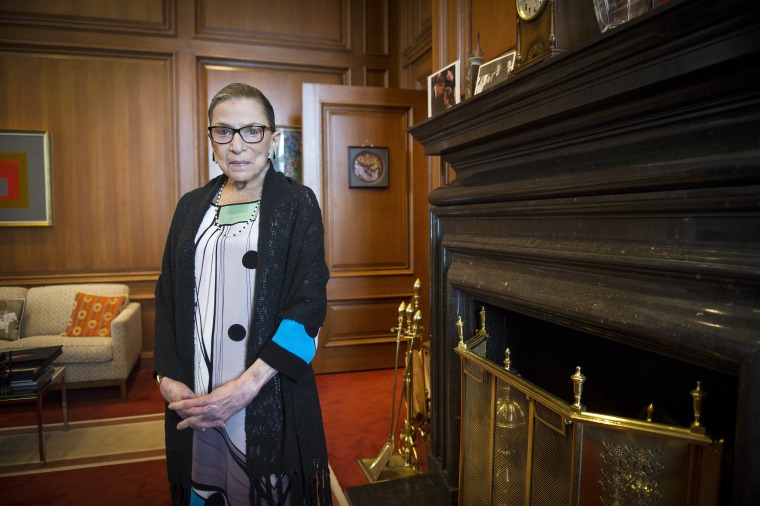"R.B.G.," the inspirational documentary about Supreme Court Justice Ruth Bader Ginsberg, is making the rounds at theaters and to say it’s inspirational is a vast understatement. The Brooklyn born-and-bred lawmaker graduated from Cornell in a time when few women went to college, was one of just nine women granted admission to Harvard Law in 1956 (yet was denied access to its reading rooms because of her gender) and became the first woman ever to join the Harvard Law Review. Eventually, she transferred to Columbia Law School and graduated first in her class in 1959, while raising a 4-year old daughter with her very supportive husband, Marty.
Now 85-years young, Ruth Bader Ginsberg (RBG) was the second woman appointed to the United States Supreme Court in 1993 and is still hard at work, advocating for women’s and minority rights. And she’s in no hurry to retire — especially now. She sees her dissents — opposing viewpoints with the majority opinion of the court — as an important exercise in democracy.
“When a justice is of the firm view that the majority got it wrong, she is free to say so in dissent. I take advantage of that prerogative, when I think it important, as do my colleagues,” she explained in a New York Times Opinion piece she wrote in 2016 to dispense life advice.
RBG has always done her best to paint her adversaries' arguments in the best light, right before she argues forcefully for the opposite position.
In fact, she very recently dissented (along with Justice Sonia Sotomayor) a Supreme Court decision that favored a Colorado baker who refused to make a gay couple a wedding cake in 2012, as she saw it as a clear case of antigay discrimination. "What matters is that [the baker] would not provide a good or service to a same-sex couple that he would provide to a heterosexual couple," read Ginsburg's dissent.
“As RBG has said, ‘Dissents speak to a future age,’ and, ‘Justices continue to think and can change. I am ever hopeful that if the court has a blind spot today, its eyes will be open tomorrow,’” says Shana Knizhnik, attorney and co-author of "Notorious R.B.G.: The Life and Times of Ruth Bader Ginsburg." “Although RBG would prefer to be in the majority, the ability to speak out in disagreement in the form of a dissenting opinion is incredibly important for the losing side, future litigants and judges, and most of all, to sound the alarm to the public,” she explains.
If you want to be heard, dissent like RBG
Learning to dissent, or express an opinion that goes against the grain, can benefit us all when we’re called upon to stand up for ourselves. Inspired by the book and the movie, we picked up a few tips and tricks on how to dissent as effectively as RBG.
As you build your case, think long term
RBG always took a long view toward change, using her talents to dismantle gender inequality, (literally) case-by-case. Describing the process as “knitting a sweater,” Ginsburg took it upon herself to educate male justices as she fought and won cases in favor of women. As Supreme Court justice, Knizhnik says the case of Ledbetter v. Goodyear Tire Co. features one of RBG’s most important dissents, because it actually led to a change in federal law.
“The majority agreed that Ms. Ledbetter had been the victim of pay discrimination, however they ruled that her claims were time-barred, because she filed them long after the discrimination had actually occurred,” explains Knizhnik. “RBG pointed out the absurdity of such an outcome, since in Ms. Ledbetter's case and indeed in most cases of pay discrimination, people who are receiving less pay as a result of discrimination are not aware until much later that that is the case. RBG put the ball in Congress's court to fix this error, and then in 2009, the Lilly Ledbetter Fair Pay Act was the first piece of legislation signed into law by President Obama.”

Find common ground and educate your opponent
As movingly depicted in the film, RBG’s unlikely friendship with conservative Justice Antonin Scalia surprised many. Though they held opposing views, they found common ground in their shared love of the opera, formed an easy rapport and bonded as true friends.
“I think the most valuable lesson is the strategy of not treating ideological foes as automatically irredeemable,” said Knizhnik when describing her biggest lesson from RBG. “RBG has always done her best to paint her adversaries' arguments in the best light, right before she argues forcefully for the opposite position. This does not mean that every argument is worthy of respect— rather, it simply means that we must strive for intellectual honesty, even when it is difficult.”
When a thoughtless or unkind word is spoken, best tune out. Reacting in anger or annoyance will not advance one’s ability to persuade.
Choose words carefully, then speak your mind (without raising your voice)
RBG credits her Cornell European literature professor Vladimir Nabokov (yes, as in the author of Lolita) for changing the way she read and wrote.
“Choosing the right word, and the right word order, he illustrated, could make an enormous difference in conveying an image or an idea,” she wrote in The New York Times "advice for living” piece. She also mentions some listening advice dispensed by her mother-in-law on her wedding day: “In every good marriage, it helps sometimes to be a little deaf. When a thoughtless or unkind word is spoken, best tune out. Reacting in anger or annoyance will not advance one’s ability to persuade.” When drafting your own personal dissent, act — don’t react. Be it verbally or via email, think carefully about the words you want to use and do your best to leave emotion out of it."
When drafting your own personal dissent, act — don’t react. Be it verbally or via email, think carefully about the words you want to use and do your best to leave emotion out of it.
Don’t take no for an answer
If you feel your rights are denied for reasons you don’t agree with, press on and steadily move past your barriers.
“RBG was never an agitator in her disposition, but she did what she could using her own talents and expertise to help achieve a more just society for all," Knizhnik says. "As she has seen the things she fought for threatened by the shifting political winds, she has spoken out. Society has come a long way since RBG was denied a job at any law firm despite being at the top of her class at Harvard and Columbia law schools. However, injustice and inequality remain. RBG teaches us that we can all do our part to help move society forward.”
And, of course, dissent.
